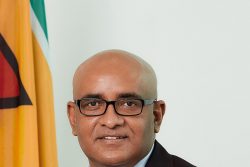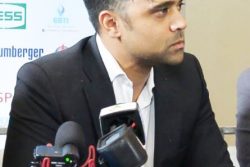Dear Editor,
Since the announcement on July 24 of Gayle`s intention to undergo surgery, a cricket fan would need to do major ‘research’ to find out what has happened to him medically. That sort of thing is not uncommon in West Indies cricket; an attitude that accounts for its current poverty. The reader may have noticed that there has been no announcement about a big farewell party for Chanderpaul and/or no information about the future of Sarwan who scored 15 Test centuries before his 30th birthday and is still just 35. Marlon Samuels had a major eye injury weeks after being the MVP in the 20-20 World Cup final in 2012. No broadcaster in the regional 20-20 series, shortly thereafter, thought there might be people interested in his welfare.
Here, I do not wish to offer for consideration, the idea that Gayle was some master strategist as captain, but rather, that his captaincy came at a time when he was the best available; that during his tenure both the team and he personally performed at a relatively high level, perhaps better than at any time in the twenty-first century, and that his dismissal was a colossal error.
Gayle was appointed captain following an injury to Sarwan after an unsuccessful tour to England, in or about 2007. I believe his captaincy met the standard of what Daniel Brettig described in writing about the captain and vice-captain chosen by Australia to succeed Michael Clarke and Steve Smith.
He said it was “a fundamental of any Australian leadership combination ‒ that the players concerned merit their place in the team” ‒ and this is a standard that is applied by all contemporary Test countries. Gayle would have been, at the time, the first player to come to mind in selecting a West Indian eleven; and what is more, the players enjoyed his leadership. The great Shivnarine Chanderpaul, Dwayne Bravo and Tino Best are three players who expressed that sentiment publicly.
Following his selection as captain, the team won the three-match one-day series against England. Shortly thereafter the team proceeded to South Africa where they won the first Test, their only Test victory in South Africa. Injuries ruined the rest of the tour, in which Gayle had minimal participation. The West Indies lost the series 2 to 1.
Next came a Sri Lankan tour to the West Indies. The teams drew the Tests and the West Indies won the one-day series.
An English visit followed. The West Indies won the Test series and lost a close one-day series, partly, as a result of a mistaken application of the Duckworth-Lewis formula by Gayle and the coach. By that time Samuels, who had become the fourth best batsman in the region, was under suspension and retained that status for the next two years.
Management accepted a hurried return invitation to play in England, beginning at the earliest date Test cricket had ever been played in England in the history of Test cricket. England naturally won this ‘Winter’ series.
The West Indies drew a Test series in New Zealand shortly thereafter. In one of the Tests Gayle came very close to batting through an innings reaching 198. A hotly contested Test series followed in Australia. In one Test, Gayle batted through the innings, and in another he scored a century in about 70 balls. He was voted man of the series.
The last Test series Gayle captained was against South Africa in the West Indies. The latter had neither Sarwan nor Samuels in the lineup. Maybe the most memorable feature of that losing series for the West Indies was the co-opting of Brandon Bess from the university on the morning of the last Test to represent his country, as no one else was available.
Gayle was stripped of his captaincy immediately prior to the 2011 World Cup. It was a time when the Board decided that their three best batsmen were all personae non gratae.
The ostensible reason for his dismissal was that Gayle had not signed the contract offered by the board. Not long afterwards, Dwayne Bravo, who had himself not signed a board contract, was made a vice-captain, thereby raising doubts about the true reason behind Gayle`s dismissal, while creating suspicions on other grounds about the real reason for Bravo`s choice.
Gayle was replaced by Darren Sammy, a promising allrounder with leadership qualities, who would fit the Australian qualification of merit referred to earlier with some difficulty. Objectively the change seemed quite unnecessary.
During his tenure as captain Gayle played some of his best innings, raising his average from the early 40s to the early 50s. His eighteen-month suspension would not have occurred if he had been captain.
A strong case can be made that stripping Gayle of the captaincy along with the harassment of Chanderpaul and Sarwan, destabilized West Indies cricket just at a time when young talented players like Darren Bravo, Kieron Powell, Sunil Narine, Kemar Roach, Adrian Barath, Kirk Edwards and Kraigg Brathwaite should have joined the veterans, and together formed the basis of a strong unit to move the game forward.
At its core, the big problem in West Indies cricket is a lack of appreciation of the players. The Gayle case is just one illustration of this intractable problem.
Yours faithfully,
Romain Pitt





